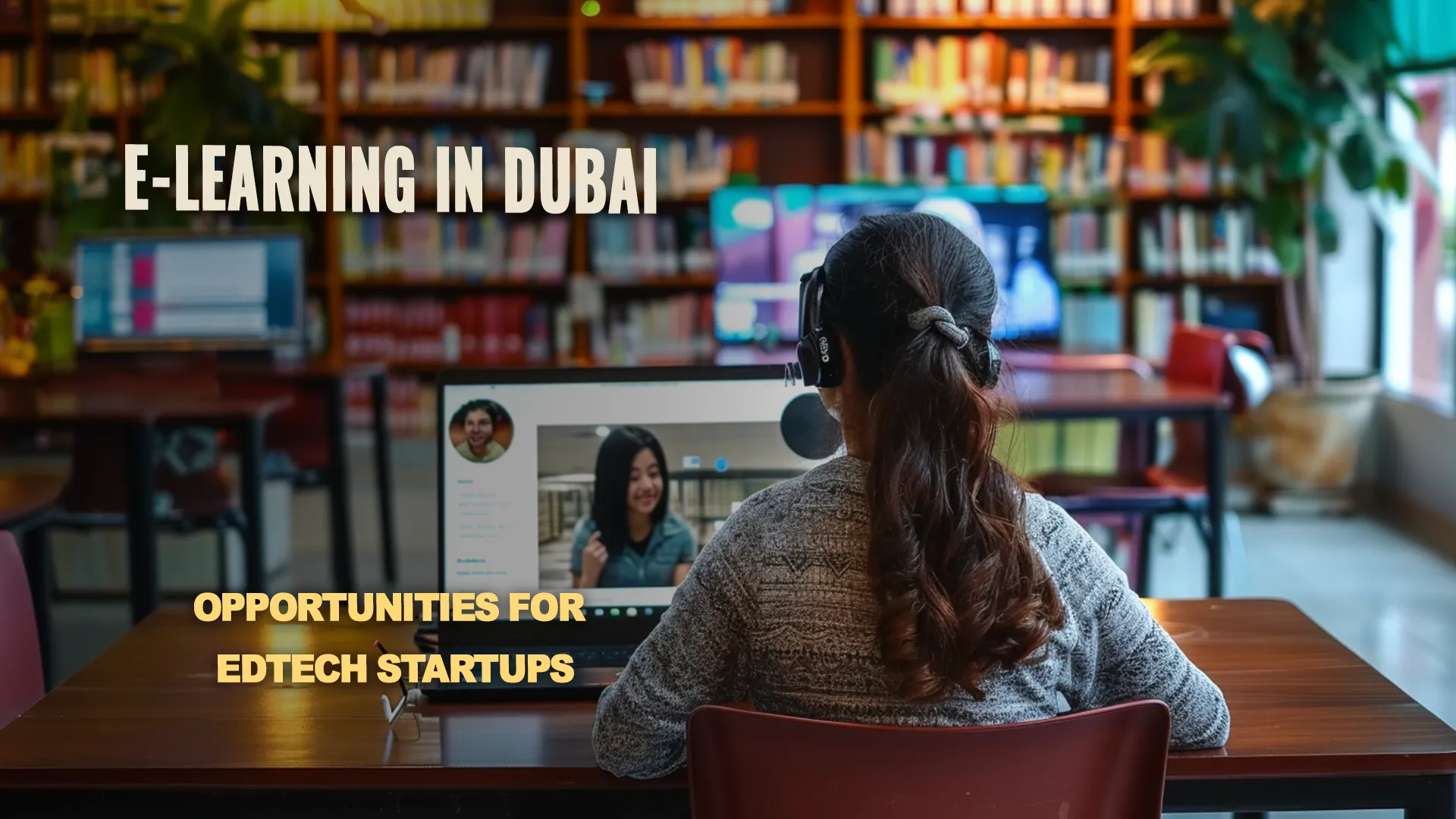E-Learning in Dubai: Opportunities for EdTech Startups
Last Updated on July 17, 2025

Introduction
A quiet revolution in education technology is underway in the vibrant city of Dubai, known for its towering skyscrapers and bustling marketplaces. The rise of e-learning has opened new vistas for educational delivery, making Dubai a burgeoning hub for EdTech startups. This article explores how these developments are transforming the academic landscape, highlighting the surge in technological adoption and the significant opportunities it presents for innovation in learning methods. From government initiatives to foster a digital learning environment to the thriving startup ecosystem that supports it, Dubai is setting a benchmark for educational excellence in the digital age.

Growth of E-Learning in Dubai
The growth of e-learning in Dubai has been phenomenal, fueled by visionary leadership and strategic investment. Historically, the education sector in Dubai has always embraced innovation, but recent years have seen a more accelerated push towards integrating technology in classrooms. This shift was catalyzed by the Dubai government’s ambitious agenda to transform the city into a knowledge-based economy, prioritizing education as a critical pillar. Initiatives such as the Smart Learning Program and the Mohammed Bin Rashid Smart Learning Project have been pivotal, involving substantial investment in digital infrastructure and educational training programs.
The impact of these initiatives has been profound and widespread. Schools across Dubai are now equipped with state-of-the-art digital tools that facilitate interactive learning and remote education, a necessity in today’s global climate. For example, using virtual reality (VR) to conduct virtual field trips and interactive learning modules has seen a significant uptick. Moreover, the government’s support for innovation in education has attracted numerous EdTech startups to the region, eager to tap into a market ripe for digital disruption. These companies contribute to the diversity of educational tools available and are crucial in driving the adoption of new learning technologies among students and educators alike.
Market Dynamics and Opportunities
The market dynamics of Dubai’s EdTech sector present a landscape rich with opportunities for startups. With an estimated worth in the billions and a robust annual growth rate, the sector is poised for exponential expansion. Several factors, including an increasing population of young learners, a high internet penetration rate, and a strong propensity among residents towards digital solutions, drive this growth. Moreover, Dubai’s strategic position as a regional business hub makes it an attractive market for international EdTech companies seeking to expand their footprint in the Middle East.
One of the most promising areas for EdTech startups is personalized learning experiences. There is a growing demand for customized educational solutions that adapt to individual learning styles and paces, especially among Dubai’s diverse student population. Startups that leverage data analytics and machine learning to provide personalized learning plans and feedback mechanisms are particularly well-positioned to succeed. Additionally, the push towards lifelong learning and professional development among Dubai’s workforce creates further opportunities for startups focusing on adult education and vocational training, providing platforms and courses that cater to professionals seeking to enhance their skills in a competitive job market.
Furthermore, the response to the global pandemic has accelerated e-learning adoption, shifting significant portions of traditional learning environments online. This transition has underscored the necessity for robust, scalable e-learning platforms, creating an urgent demand for innovative solutions that EdTech startups are well-equipped to meet. From cloud-based learning management systems to AI-driven educational apps, the potential for growth and impact in Dubai’s e-learning sector is substantial, promising a lucrative venture for new entrants and established players.
Technological Infrastructure
Dubai’s robust technological infrastructure is pivotal in supporting and advancing the e-learning sector, making it a fertile ground for EdTech startups. The city’s high-speed internet access and widespread connectivity are essential for online learning platforms, ensuring digital educational content can be delivered efficiently and without interruption. The government’s significant investment in digital infrastructure, part of the broader Smart Dubai initiative, aims to transform Dubai into the world’s most innovative and connected city. This initiative includes expanding fiber-optic networks and enhancing Wi-Fi accessibility in public areas, which facilitates seamless access to online learning resources in homes and schools and virtually anywhere across the city.
Moreover, Dubai’s data centers and cloud services infrastructure are critical enablers for EdTech companies. These facilities provide the necessary backend support for hosting large volumes of educational data and applications. This capability allows EdTech startups to scale up their services quickly, catering to increasing users without compromising performance or security. The presence of major cloud service providers, like Amazon Web Services and Microsoft Azure, in the region also ensures that startups can access best-in-class technology for hosting and managing their applications. This setup is particularly beneficial for startups that utilize heavy data applications, such as adaptive learning platforms that require real-time data processing to personalize user content.
In addition to the physical and data infrastructure, Dubai fosters a supportive innovation ecosystem through various technology parks and incubators, such as Dubai Internet City and Dubai Silicon Oasis. These hubs provide state-of-the-art facilities and services and bring together entrepreneurs, investors, and experts in a collaborative environment. This ecosystem supports EdTech startups by offering opportunities for networking, mentorship, and access to venture capital, which are crucial for growth and innovation. By situating themselves in these tech hubs, startups gain visibility and are better positioned to attract partnerships and funding, propelling their technologies from conceptual stages to market-ready products.
Case Studies of Successful EdTech Startups
Examining successful EdTech startups based in Dubai offers valuable insights into practical strategies and practices that can be emulated by new entrants in the market. One notable example is Alef Education, a startup that has revolutionized the digital education landscape in Dubai and beyond. Alef’s platform utilizes AI to deliver a customized learning experience to students across various subjects. By analyzing student interactions and performance, the platform adapts educational content to suit individual learning paces and styles, demonstrating significant improvements in student engagement and academic outcomes. Alef Education’s success is mainly attributable to its ability to seamlessly integrate with existing school curriculums, making it an attractive solution for educational institutions looking to enhance their teaching methodologies.
Another success story is Lamsa, an EdTech company focusing on early childhood education through an interactive app offering educational games, stories, and videos. Lamsa has gained widespread popularity in Dubai and the broader Middle East by providing content that is culturally relevant and available in multiple languages, including Arabic. This approach has filled a niche in the market and ensured that content resonates with the local population, thereby increasing its adoption. Lamsa’s achievements highlight the importance of understanding and catering to cultural contexts in educational content, a key consideration for EdTech startups aiming to capture the diverse .
Lastly, the development of BON Education’s online learning programs illustrates how addressing specific educational needs can lead to substantial market success. BON Education has specialized in creating online professional development courses for teachers and educators, recognizing the need for ongoing education and skill enhancement in the teaching profession. Their courses, designed in collaboration with local educational authorities and institutions, help educators stay abreast of the latest teaching techniques and educational technologies, underscoring the potential for EdTech startups to impact education through continuous professional development.
These case studies exemplify how integrating technology with a deep understanding of Dubai’s educational needs and cultural context can lead to successful ventures in the EdTech sector. For startups in this space, these examples provide a roadmap for developing impactful, scalable, and culturally attuned educational solutions that meet the unique needs of Dubai’s learners.

Challenges in the EdTech Sector
Despite the burgeoning opportunities, startups in Dubai’s EdTech sector face several challenges that can impede growth and scalability. One of the primary hurdles is the intense competition, both locally and from international firms entering the market. New startups must differentiate themselves with unique offerings or superior technology to capture a significant market share. This necessitates continuous innovation and swiftly adapting to changing educational trends and technologies. Moreover, startups need to establish strong brand recognition and trust within the local community, which can be particularly challenging for new entrants without a proven track record.
Another significant challenge is the regulatory environment. Although Dubai is known for its business-friendly policies, the education sector is highly regulated to ensure quality and adherence to national education standards. Navigating these regulations requires a thorough understanding and the ability to comply with stringent accreditation processes, which can be resource-intensive. Additionally, data privacy regulations are becoming increasingly stringent, as educational platforms often handle sensitive student information. Compliance with these privacy laws is critical but can be complex and costly for startups.
Funding is also a crucial concern for EdTech startups. While substantial interest is in investing in innovative educational solutions, securing adequate funding to scale operations and enhance technological offerings remains challenging. Startups must demonstrate clear value propositions and potential for high returns to attract investment from venture capitalists and angel investors. Furthermore, they need to effectively manage these funds to sustain long-term growth, which requires savvy financial planning and management.
Conclusion
The EdTech sector in Dubai presents a dynamic and promising arena for startups, driven by a robust governmental push towards educational innovation and a growing demand for digital learning solutions. Opportunities abound for those who can navigate the challenges of competition, regulation, and funding with innovative solutions that resonate with educational institutions, students, and parents alike. Successful startups like Alef Education, Lamsa, and BON Education are beacons for new ventures, illustrating the potential for significant impact and profitability in EdTech.
As Dubai continues to cultivate a knowledge-based economy, the role of technology in education will undoubtedly expand, offering further opportunities for EdTech startups to innovate and thrive. The ongoing commitment to transforming Dubai into a global hub for education and technology bodes well for the future of the EdTech sector. By leveraging Dubai’s robust technological infrastructure, favorable business environment, and strategic geographical position, EdTech companies are well-positioned to succeed locally and expand their reach globally.
In conclusion, while challenges remain, the future is bright for EdTech startups in Dubai. They promise a new era of educational delivery that is more inclusive, effective, and aligned with the global market’s future needs. As these companies continue to navigate the new waters of Dubai’s educational landscape, their journey will likely be marked by innovation, growth, and an enduring impact on how education is perceived and delivered in the region and beyond.





